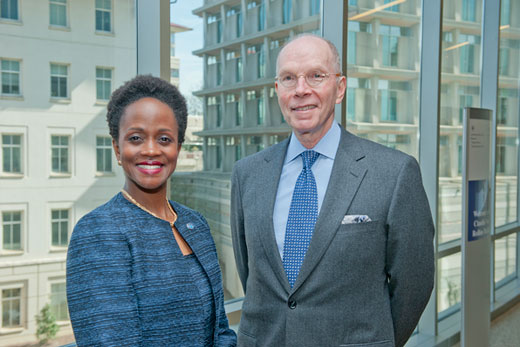Global health is at the core of national security and diplomacy and is a priority of the Obama Administration, said Esther Brimmer, U.S. assistant secretary of state for international affairs, during a recent visit to the Emory Global Health Institute (GHI). Effectively addressing key issues of global health requires an expert-based, non-partisan commitment, and depends on partnerships among diverse organizations, coordination, and sustainability, she noted.
Brimmer met with GHI director Jeffrey Koplan, Emory Provost Earl Lewis, Oxford College Dean Stephen Bowen; representatives of the CDC Center for Global Health, and faculty members from the Rollins School of Public Health, School of Medicine, Graduate School, Law School and Emory College.
Brimmer’s meetings at Emory included discussion about how academic institutions can better work with governments to improve global health. The International Association of National Public Health Institutes (IANPHI), a global public health partnership led by Emory and Koplan, was a significant focus.
The Administration is taking steps to spur innovation in global health, Brimmer said, including developing more sources of information, partnering with organizations outside of government, developing public-private partnerships, and creating new fellowship programs.
Non-communicable diseases (NCDs) currently are the largest global health focus of the State Department, said Brimmer, especially in light of a recent high-level United Nations meeting on NCDs and their effects on quality of life, economic development, and security. As part of the fight to control these diseases, the Administration would like to create global health service platforms in maternal health, safe water, hygiene, and tropical diseases.
The security community is adopting a broader understanding of the meaning of national security that includes global health and improved surveillance for naturally emerging diseases and deliberate health-related attacks, says Brimmer, whose job includes working with groups of people with a variety of expertise in addition to traditional military defense.
“International security depends on the well-being of society, and some of our biggest threats arise from weakness, not strength, said Brimmer.
Discussion at the meeting included the U.S. global commitment to women’s rights and women’s health, interagency collaboration, mental health as a critical global health burden, and the need to tap committed college students and other young people as an important resource in advancing global health.

